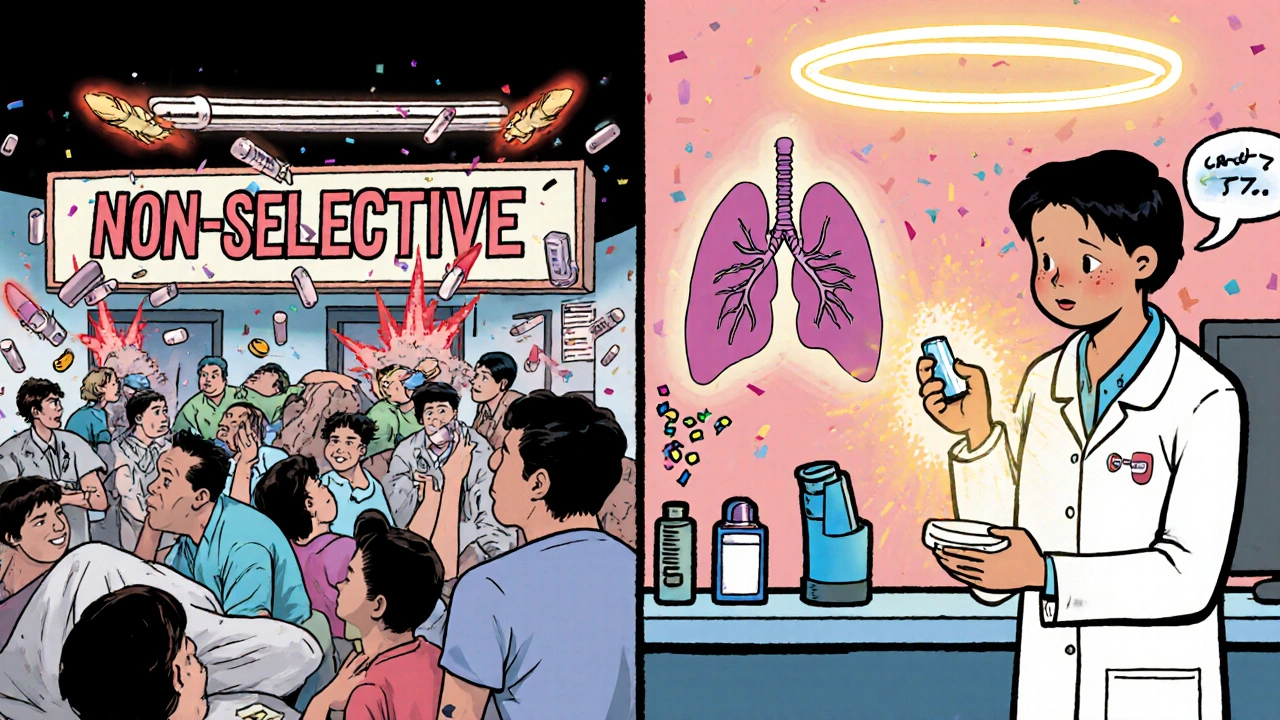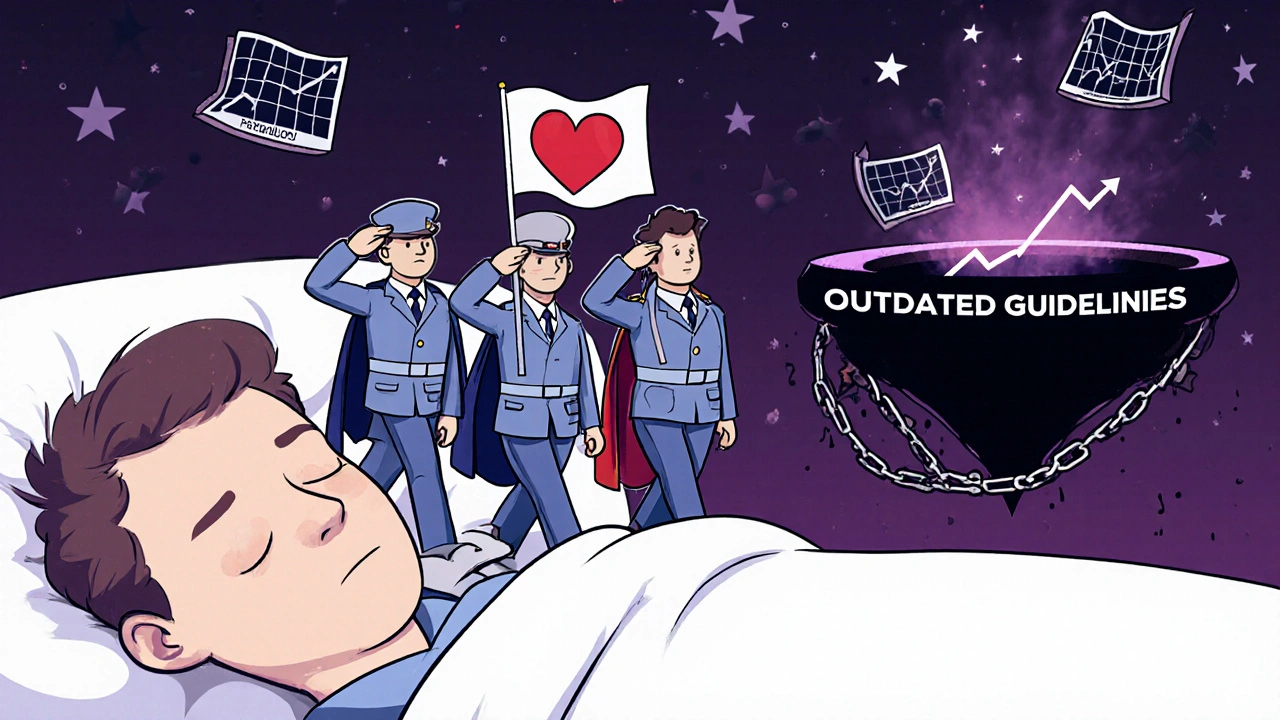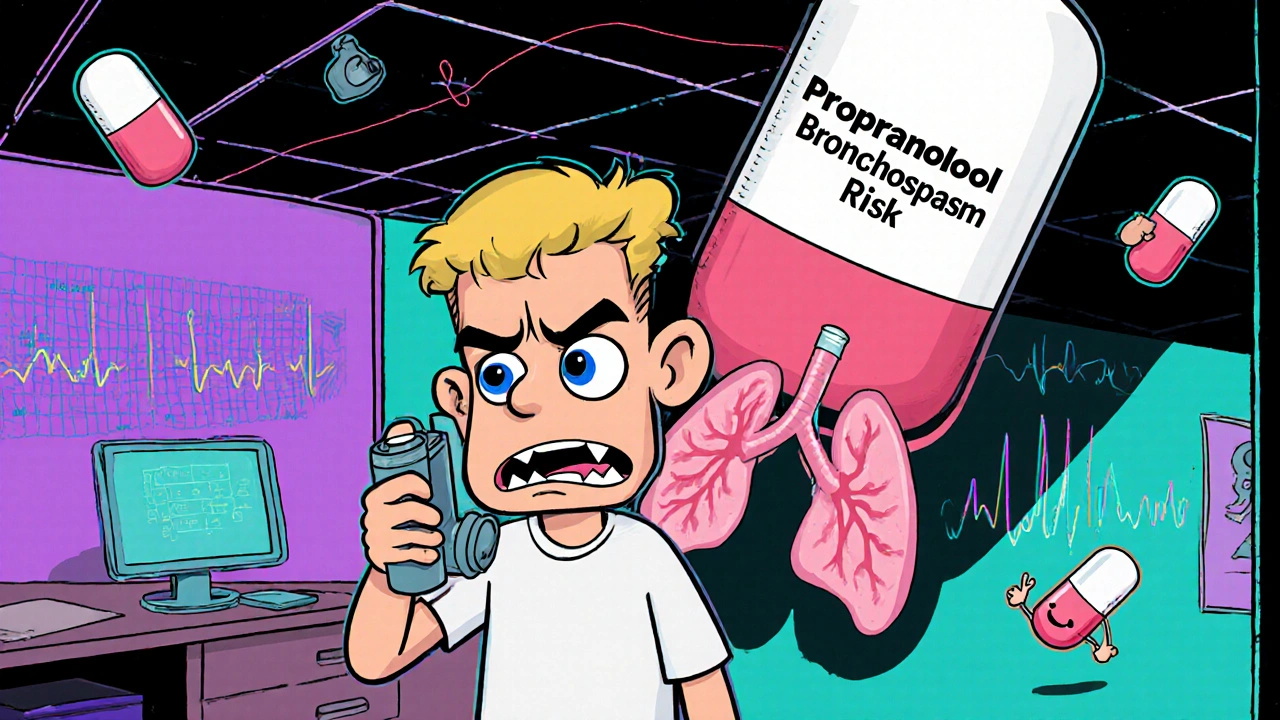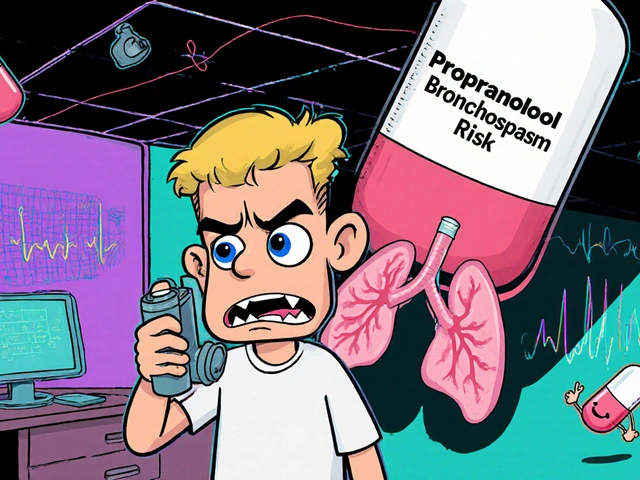Beta-Blocker Safety Calculator for Asthma
Your Safe Beta-Blocker Options
For years, if you had asthma and needed a beta-blocker for your heart, doctors told you: don’t take them. It wasn’t just a caution-it was a hard rule. The fear was simple: beta-blockers could tighten your airways, trigger a severe asthma attack, and even make your rescue inhaler less effective. But things have changed. New research, real-world data, and decades of patient outcomes are rewriting the playbook. The truth isn’t black and white anymore. For many people with asthma, beta-blockers aren’t off-limits-they’re just not one-size-fits-all.
Why Beta-Blockers Were Banned in Asthma
The original warning came from the earliest beta-blockers-drugs like propranolol and nadolol. These are non-selective, meaning they block both beta-1 receptors (in the heart) and beta-2 receptors (in the lungs). Beta-2 receptors are the ones that keep your airways open. When they’re blocked, your bronchial muscles tighten. That’s bronchospasm. And for someone with asthma, that’s dangerous.Early studies showed a clear pattern: single doses of non-selective beta-blockers could drop lung function (FEV1) by up to 10%. Worse, they could blunt the effect of albuterol-the go-to rescue inhaler for asthma flare-ups. If your inhaler stops working because of a medication you’re taking for your heart, that’s a life-threatening mix.
That’s why the British National Formulary (BNF) still says beta-blockers should “usually be avoided” in asthma patients. But that word-“usually”-is the key. It’s not “never.”
The Shift: Cardioselective Beta-Blockers Are Different
Not all beta-blockers are the same. The newer ones-called cardioselective-are designed to target the heart and leave the lungs alone. They have at least 20 times more affinity for beta-1 receptors than beta-2. That small difference changes everything.Drugs like atenolol, metoprolol, bisoprolol, and celiprolol are cardioselective. In studies involving over 240 asthma patients given single doses, none reported worsening symptoms. FEV1 dropped by just 7.5% on average-far less than with non-selective drugs-and crucially, it bounced back fully after using an inhaler.
Even more telling: in long-term studies, where patients took these drugs daily for weeks or months, there were no spikes in asthma attacks, no drop in lung function, and no need to stop treatment. One study compared atenolol and metoprolol head-to-head in 14 asthma patients. Atenolol caused significantly less wheezing, fewer asthma-free days lost, and better evening peak flow readings. It didn’t just work for the heart-it was gentler on the lungs.
What Does the Evidence Really Say?
A meta-analysis of 29 controlled trials looked at people with asthma or COPD who took cardioselective beta-blockers. The results were clear:- No deaths or severe bronchospasm cases were reported.
- Rescue inhalers still worked just as well.
- FEV1 stayed stable over time.
- Patients had fewer heart-related events and lower death rates.
The American Academy of Family Physicians (AAFP) now says cardioselective beta-blockers are safe for mild to moderate asthma. The European Journal of Clinical Pharmacology goes further: it recommends atenolol as the preferred choice when beta-blockers are needed. Even the BNF, while cautious, admits that if a patient has well-controlled asthma and a strong cardiac reason for beta-blockers, a cardioselective option can be tried-under specialist supervision.
One surprising twist? Long-term use might actually help. Animal studies show that while beta-blockers can briefly increase airway sensitivity at first, over weeks, they seem to reduce inflammation in the airways. That could mean, over time, they don’t just avoid harm-they might even reduce asthma severity.

Which Beta-Blockers Are Safe? Which Are Not?
Here’s a simple breakdown:| Type | Examples | Risk for Asthma | Notes |
|---|---|---|---|
| Cardioselective (Preferred) | Atenolol, Bisoprolol, Metoprolol | Low | Atenolol has the strongest safety data in direct comparisons. Start low, monitor closely. |
| Cardioselective with ISA | Celiprolol, Acebutolol | Very Low | Celiprolol may even reduce bronchoconstriction. Not widely used in the UK but promising. |
| Non-Selective | Propranolol, Nadolol, Timolol | High | Avoid completely unless no other option exists and under strict hospital monitoring. |
| Alpha-Beta Blockers | Labetalol | High | Also blocks alpha receptors-can cause airway narrowing. Not recommended. |
Bottom line: If you have asthma and need a beta-blocker, ask your doctor about atenolol or bisoprolol. Avoid propranolol, timolol, and labetalol unless you’re in a hospital setting with full monitoring.
How to Take Them Safely
If your doctor says it’s okay, here’s how to do it right:- Start low. Begin with the smallest possible dose-often half the usual starting dose.
- Monitor lung function. Get a baseline FEV1 test before starting. Repeat it after 1-2 weeks.
- Keep your inhaler close. Always have your rescue inhaler with you, especially in the first few weeks.
- Watch for warning signs. If you notice new wheezing, increased shortness of breath, or your inhaler isn’t working as well, call your doctor.
- Don’t stop suddenly. Like all beta-blockers, stopping abruptly can trigger heart problems. Always taper under medical guidance.
One study of 19 asthma patients on bisoprolol daily for two weeks found no increase in asthma flare-ups. Even when researchers induced bronchoconstriction, the patients’ inhalers still worked just as well as before. That’s the kind of data that’s changing guidelines.

What About Severe Asthma?
The data is less clear here. Most studies focus on mild to moderate asthma. If you have severe, poorly controlled asthma-or frequent hospitalizations-beta-blockers are still risky. The potential benefit for your heart might not outweigh the chance of triggering a life-threatening attack.In those cases, doctors will look for alternatives: calcium channel blockers like amlodipine, or other heart medications that don’t touch beta receptors. But if your heart condition is serious-say, after a heart attack-and your asthma is stable, even severe asthma patients have been safely transitioned to cardioselective beta-blockers under close supervision.
Real-World Impact: Why This Matters
Beta-blockers reduce death after a heart attack by up to 34%. For someone with both heart disease and asthma, not taking them could be more dangerous than taking the right one. The old rule-avoid all beta-blockers-was meant to protect. But now we know: avoiding the right one might kill you.One patient in Manchester, mid-60s, had a heart attack in 2023. He’d had asthma since childhood but managed it well with inhalers. His cardiologist wanted to start bisoprolol. His GP was hesitant. After reviewing the evidence together, they started him on 6.25mg daily. Two weeks later, his FEV1 was unchanged. His heart rate dropped. His asthma didn’t flare. He’s been stable for over a year.
That’s the new standard. It’s not about avoiding risk-it’s about managing it.
What’s Next?
Researchers are now looking at whether certain beta-blockers can actually reduce airway inflammation over time. Celiprolol, for example, appears to block the bronchoconstrictive effects of other beta-blockers. That’s not just safety-it’s potential therapy.Meanwhile, guidelines are slowly catching up. The European Society of Cardiology now recommends cardioselective beta-blockers for heart failure patients with asthma, provided they’re monitored. The UK’s NICE guidelines are expected to update soon.
For now, the message is clear: if you have asthma and heart disease, don’t assume beta-blockers are off-limits. Ask for a cardioselective option. Get tested. Stay monitored. And don’t let outdated rules keep you from the treatment that could save your life.
Can I take beta-blockers if I have asthma?
Yes, but only certain types. Cardioselective beta-blockers like atenolol, bisoprolol, or metoprolol are generally safe for people with mild to moderate asthma when started at a low dose and monitored by a doctor. Non-selective beta-blockers like propranolol should be avoided.
Will beta-blockers make my inhaler less effective?
Non-selective beta-blockers can reduce how well your rescue inhaler works by blocking the same receptors it targets. Cardioselective beta-blockers have minimal effect on lung receptors, so your inhaler should still work normally. Studies confirm that bronchodilator response remains intact with drugs like atenolol and bisoprolol.
Is atenolol the safest beta-blocker for asthma?
Yes, based on direct comparative studies, atenolol shows the least impact on lung function in asthma patients. It caused less wheezing and fewer asthma symptoms than metoprolol in head-to-head trials. It’s often the first choice when beta-blockers are needed.
What should I do if I start beta-blockers and feel wheezy?
Use your rescue inhaler immediately. If symptoms don’t improve within 10-15 minutes, contact your doctor or seek urgent care. Don’t stop the beta-blocker on your own-sudden withdrawal can cause heart problems. Your doctor may adjust the dose or switch you to a different medication.
Can I take beta-blockers if I have COPD too?
Yes. In fact, studies show cardioselective beta-blockers are safe and even beneficial for people with COPD. They reduce the risk of death and hospitalization from heart problems without worsening lung function. Many experts now consider them standard care for COPD patients with heart disease.
How long does it take for beta-blockers to affect my lungs?
The effect on lung function can happen within hours of the first dose, especially with non-selective types. But with cardioselective beta-blockers, any small drop in FEV1 usually stabilizes within 1-2 weeks. Long-term use doesn’t cause ongoing decline-in fact, some evidence suggests it may improve airway inflammation over time.
Should I get a lung test before starting a beta-blocker?
Yes. A baseline spirometry test (measuring FEV1) is recommended before starting any beta-blocker if you have asthma or COPD. Follow-up testing after 1-2 weeks helps confirm the medication isn’t affecting your breathing. This is standard practice in specialist clinics.


Man, I remember when my doc told me beta-blockers were a hard no if you had asthma. I had a heart issue after my dad’s bypass, and I nearly cried thinking I’d have to skip the meds that could save me. Then I found this article. Turns out, atenolol was the quiet hero I didn’t know I needed. No wheezing. No panic. Just steady heartbeats and my inhaler still working like a charm. Sometimes the old rules aren’t wrong-they’re just outdated. And that’s okay.
YES. YES. YES. This is exactly why we need to stop treating medicine like dogma. Cardioselective beta-blockers? Safe. Propranolol? Avoid like the plague. Start low. Monitor. Trust the data. Don’t let fear override science. Your lungs aren’t your enemy. Outdated guidelines are. Please, if you’re on the fence-talk to your doc. Don’t just assume you’re stuck.
So now we’re supposed to believe that a drug that literally shuts down your airways is ‘safe’ if it’s ‘cardioselective’? That’s like saying a loaded gun is safe if you only point it at your foot and not your head. The fact that they’re ‘less bad’ doesn’t mean they’re good. And why is atenolol always the golden child? Because it’s cheap? Because Big Pharma wants you to think it’s fine? I’ve seen patients crash after being told ‘it’s fine’-and then they end up in the ER with a collapsed lung and a heart that’s still beating because the drug didn’t kill it fast enough. This isn’t progress. It’s negligence dressed in data.
It’s strange how we treat medical knowledge like it’s a static monument instead of a living conversation. For decades, we were told ‘no beta-blockers’-and that kept people alive. Now we’re told ‘some are okay’-and suddenly, the same people who feared them are being called irrational. But maybe the truth is somewhere in the middle. Maybe safety isn’t about absolutes. Maybe it’s about listening-to the body, to the data, to the quiet voice that says, ‘Wait. Let’s check again.’ I didn’t know I could take bisoprolol until I read this. Now I’m asking my doctor. Not because it’s trendy. Because I want to live longer.
THIS IS SO IMPORTANT. If you have asthma and heart disease, you’re already carrying so much. Don’t let outdated fear rob you of a chance to live better. I’ve seen friends die because they didn’t take their heart meds out of fear of their asthma. Please-talk to your doctor. Get tested. Start low. Keep your inhaler handy. You’re not being reckless-you’re being brave. And you deserve to have both your heart and lungs protected. You’ve got this.
Let me tell you something about Western medicine. They love to say ‘new research’ like it’s some kind of divine revelation. But what they don’t tell you? The same people who said beta-blockers were forbidden in asthma are the ones who now say ‘oh, but only if it’s cardioselective.’ It’s the same system. The same doctors. The same pharmaceutical reps whispering in their ears. I’ve seen people in Lagos with asthma on propranolol because they can’t afford the ‘safe’ ones-and they’re fine. Why? Because their bodies aren’t as fragile as the studies say. Maybe the problem isn’t the drug. Maybe it’s the fear. Maybe it’s the profit. Maybe we’ve been scared into silence for too long.
Okay but real talk-why is no one talking about how cool it is that beta-blockers might actually *help* asthma long-term? Like, not just avoid harm but reduce inflammation? That’s wild. It’s like the drug that was supposed to hurt you is quietly fixing things underneath. I’ve been on bisoprolol for 8 months. My inhaler usage dropped by half. My lung function? Stable. My anxiety? Also lower. Maybe we’re not just tolerating these meds-we’re letting them change us for the better. That’s not scary. That’s hope.
Let me be the one to say it: this whole ‘cardioselective’ thing is a marketing ploy. The studies? Small. Short-term. Funded by pharma. Atenolol? It’s been around since the 70s. It’s generic. It’s cheap. That’s why they push it-not because it’s safer, but because it’s profitable. And if you think your FEV1 drop of 7.5% is ‘fine,’ you’re not thinking about the 1 in 500 who gets a full-blown attack and ends up intubated. I’ve been in the ER with asthma. I know what ‘fine’ looks like. It doesn’t look like breathing. It looks like panic. And nobody warns you about that.
Look. I get it. You want to feel safe. But this isn’t science-it’s wishful thinking wrapped in a table. The BNF says ‘usually avoid.’ That’s not a suggestion. It’s a warning. And now you’re telling people to just ‘try it’? What if you’re the one who gets the rare case? The one who dies because someone thought ‘it’s probably fine’? You think your life is worth the gamble? I’ve seen too many people die because they trusted ‘new’ over ‘cautious.’ This isn’t empowerment. It’s recklessness with a PubMed citation.
ok so… like… what if beta blockers are actually a *government mind control thing*?? 😳 like… they make you calmer… but also… what if they’re secretly suppressing your *natural lung defenses*?? 🤔 i mean… why else would they push this so hard?? also… i think the ‘studies’ are fake… like… the FEV1 numbers… they’re all from the same 3 labs… and… uh… did you know timolol is used in eye drops?? 😳 maybe they’re testing it on lungs to see if we’ll just… stop breathing?? 🤯 #betacontrol #cureisabait
Stop overcomplicating this. If you have asthma, don’t take beta-blockers. Period. The data is noisy. The studies are small. The ‘safe’ ones still lower FEV1. And your inhaler? It’s not magic. It’s a bandaid. If your heart’s bad, get a stent. Get a pacemaker. Don’t poison your lungs with a drug that’s designed to slow your heart. This isn’t progress. It’s desperation dressed as innovation. I’ve seen people die from this. Don’t be next.
Let me be clear: the medical establishment has spent decades enforcing a dogma that was never scientifically absolute. Now, when evidence emerges that contradicts their past errors, they respond not with humility but with cautious, half-hearted revisions that still leave patients terrified. The fact that atenolol has been shown in multiple trials to preserve bronchodilator response while reducing cardiac mortality is not a nuance-it is a triumph of evidence over inertia. To continue avoiding these drugs out of fear is not prudence. It is cowardice. And for those who cling to outdated guidelines because they are comfortable, you are not protecting patients. You are preserving your own intellectual laziness. The data does not lie. The patients who survived are the proof. The rest is noise.